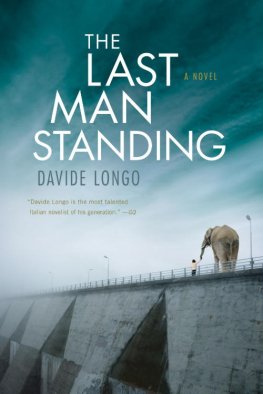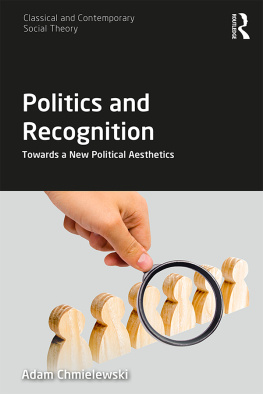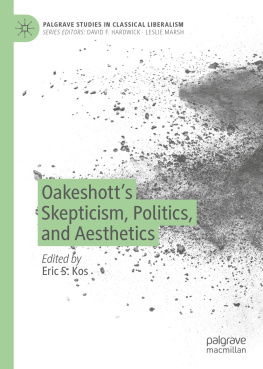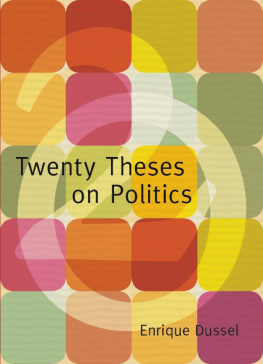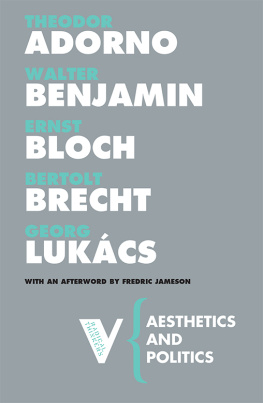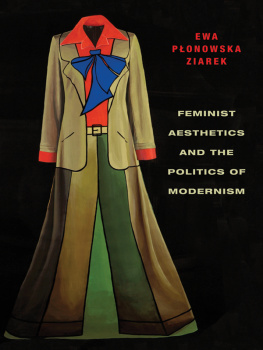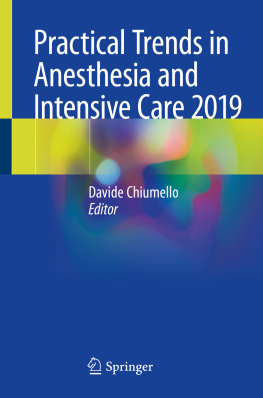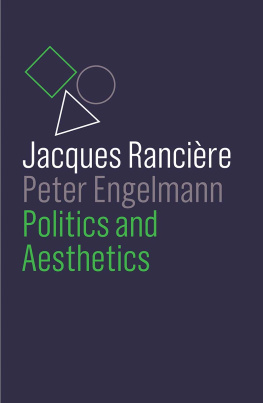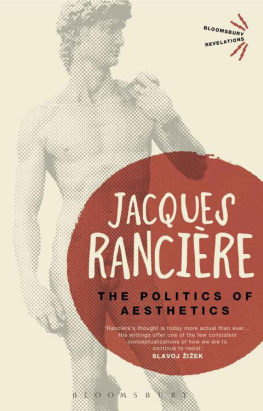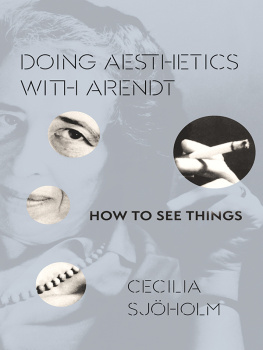Davide Panagia - Ten Theses for an Aesthetics of Politics
Here you can read online Davide Panagia - Ten Theses for an Aesthetics of Politics full text of the book (entire story) in english for free. Download pdf and epub, get meaning, cover and reviews about this ebook. year: 0, publisher: Minnesota University Press, genre: Romance novel. Description of the work, (preface) as well as reviews are available. Best literature library LitArk.com created for fans of good reading and offers a wide selection of genres:
Romance novel
Science fiction
Adventure
Detective
Science
History
Home and family
Prose
Art
Politics
Computer
Non-fiction
Religion
Business
Children
Humor
Choose a favorite category and find really read worthwhile books. Enjoy immersion in the world of imagination, feel the emotions of the characters or learn something new for yourself, make an fascinating discovery.

- Book:Ten Theses for an Aesthetics of Politics
- Author:
- Publisher:Minnesota University Press
- Genre:
- Year:0
- Rating:4 / 5
- Favourites:Add to favourites
- Your mark:
- 80
- 1
- 2
- 3
- 4
- 5
Ten Theses for an Aesthetics of Politics: summary, description and annotation
We offer to read an annotation, description, summary or preface (depends on what the author of the book "Ten Theses for an Aesthetics of Politics" wrote himself). If you haven't found the necessary information about the book — write in the comments, we will try to find it.
Ten Theses for an Aesthetics of Politics — read online for free the complete book (whole text) full work
Below is the text of the book, divided by pages. System saving the place of the last page read, allows you to conveniently read the book "Ten Theses for an Aesthetics of Politics" online for free, without having to search again every time where you left off. Put a bookmark, and you can go to the page where you finished reading at any time.
Font size:
Interval:
Bookmark:
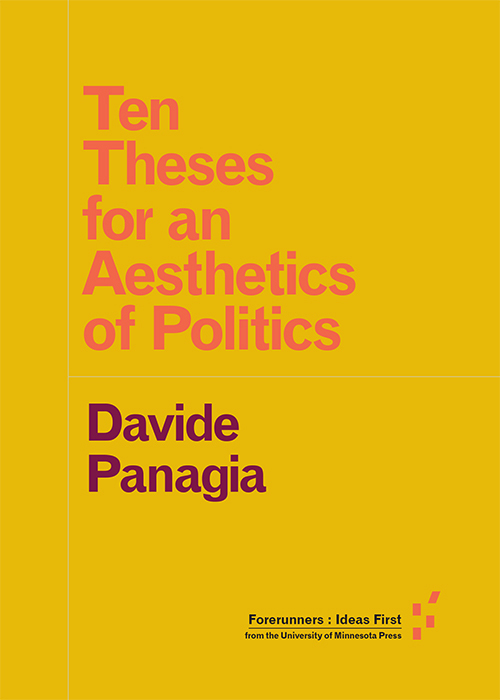
Forerunners: Ideas First from the University of Minnesota Press
Original e-works to spark new scholarship
F ORERUNNERS: I DEAS F IRST is a thought-in-process series of breakthrough digital works. Written between fresh ideas and finished books, Forerunners draws on scholarly work initiated in notable blogs, social media, conference plenaries, journal articles, and the synergy of academic exchange. This is gray literature publishing: where intense thinking, change, and speculation take place in scholarship.
Ian Bogost
The Geeks Chihuahua: Living with Apple
Andrew Culp
Dark Deleuze
Sohail Daulatzai
Fifty Years of The Battle of Algiers : Past as Prologue
Grant Farred
Martin Heidegger Saved My Life
David Golumbia
The Politics of Bitcoin: Software as Right-Wing Extremism
Gary Hall
The Uberfication of the University
John Hartigan
Aesops Anthropology: A Multispecies Approach
Mark Jarzombek
Digital Stockholm Syndrome in the Post-Ontological Age
Nicholas A. Knouf
How Noise Matters to Finance
Akira Mizuta Lippit
Cinema without Reflection: Jacques Derridas Echopoiesis and Narcissism Adrift
Reinhold Martin
Mediators: Aesthetics, Politics, and the City
Shannon Mattern
Deep Mapping the Media City
Davide Panagia
Ten Theses for an Aesthetics of Politics
Jussi Parikka
The Anthrobscene
Steven Shaviro
No Speed Limit: Three Essays on Accelerationism
Sharon Sliwinski
Mandelas Dark Years: A Political Theory of Dreaming
Davide Panagia
University of Minnesota Press
Minneapolis
Ten Theses for an Aesthetics of Politics by Davide Panagia is licensed under a Creative Commons Attribution-NonCommercial-NoDerivatives 4.0 International License.
Published by the University of Minnesota Press
111 Third Avenue South, Suite 290
Minneapolis, MN 554012520
http://www.upress.umn.edu
The University of Minnesota is an equal-opportunity educator and employer.
We didnt need dialogue. We had faces.
N ORMA D ESMOND in Sunset Boulevard (1950)
T HE FIRST DRAFT of these Ten Theses for an Aesthetics of Politics was written some years ago. The revisions took a while. And the willingness to consider publication was prolonged. All of this is to say that Im thrilled to have the opportunity to participate in such an exciting publishing venture as Forerunners that fosters the critical intensity of the transitory feuilleton in the digital age. What spurred my writing was a sense of dissatisfaction (palpable throughout this text) with a general contention of critical thinking: namely, that appearances are collusive to progressive politics. The reigning orthodoxy in the study of aesthetics and politics considers aesthetic objects as things about whose politics we must be skeptical. All forms of aesthetic pleasure are reducible to consumption, so it seems, and appearances seem more or less equivalent to the commercial products Madison Avenue wants us to want. One rarely speaks favorably of Hollywood filmmaking, or of pop music. And it is even more rare to find positive accounts of spectatorship. All of this is to say that studies in the aesthetics of politics are oftennot always, but more often than notpresented in the negative, where aesthetic appreciation and distraction is something that our most heartened forms of political judgment and critical thinking must overcome. This is because, try as we might, we just cant seem to shake the epistemic intuition of our modern modes of political thinking that say appearances are deceitful and all surfaces must be plumbed so as to get at the truth of the matter.
In short, what spurred this piece of writing was a dissatisfaction with a collective common sense that imbues much contemporary political criticism: namely, that aesthetic experiences demand epistemic critique, and that critique requires a denial of aesthetic appreciation. The world of appearances, in short, is delusion all the way down.
In part my dissatisfaction with this approach stems from what I take to be a demonization of the demos. For if it is true that instances of aesthetic appreciation are akin to intellectual stultification, and if spectatorship is characterized as a space of distraction from what is properly political, then the everyday moments we all have of looking, hearing, touching, tasting, and smelling, and those minute instances whereby we derive an unverifiable sense of pleasure or disturbance from such moments of aesthetic appreciation, are simply bad. Whats worse, our willingness to entertain such moments means perpetuating a pervasive evil in the worldthe evil of political seduction and moral distraction. If aesthetic appreciation is unpurposive, political life must be purposiveand the two trajectories shall never meet; or, better, must never meet.
The experiments of thinking, of engagement, and discussion that generated the Ten Theses for an Aesthetics of Politics took place in undergraduate and graduate classrooms at Trent University (Canada) where I had the privilege to teach for ten years, at the University of California, Los Angeles, where I currently teach, and at various conferences, workshops, bars, restaurants, living rooms, and other sundry places and spaces with generous people provoked by the idea that maybe, just maybe, our relation to the world of appearances isnt as settled as we think it is, and that one of the ways in which we may think the aesthetics of politics is to consider not just the epistemic conditions for understanding works but the diverse forms of relations and solidarity that emerge when we attend to a world of advening appearances.
There was one other occurrence that spurred my sense of urgency about the importance of rethinking the relation of politics and aesthetics, and that is the proliferation of sites and sounds of peoples throughout the globe traversing invisible lines, seeking refuge and asylum. And it became somewhat perspicuous that the critical attitude taken toward aesthetic objects is akin to (maybe even the same as) the hesitance afforded stateless peoples who affront our visual field in the media, at airport border crossings, in everyday encounters. In all instances, the intuition is to turn away from the appearance by asking a version of the question How do I know that she really is the way she appears to be? How do I know that the refugee really needs asylum? Or, how do I know that the aesthetic object is what it seems to be? These two different but parallel questions offer the same hesitation: that is, a reluctance to give admittance to that which advenes; a reluctance that is buttressed by a set of demands and expectations for verification through reason-giving, for fear that without these the inherited ways of being in the world will be dislodged. Both scenarios beg a form of spectatorship and both take a knowing stance toward a perceptual field so as to stay the difficult work of be/holding.
I am taken by that moment in Stanley Cavells writings that ponders our need to verify the truth of a sensation that cant be verified (a need he calls skepticism). Such a sensation can be a sense of beauty, or suffering, or happiness, or hunger. It describes a moment when we are captured by the appearance of something to which we cant relate. A classic formulation, the one that captures me most, is when Cavell describes film actors on a screen not as humans but as
Font size:
Interval:
Bookmark:
Similar books «Ten Theses for an Aesthetics of Politics»
Look at similar books to Ten Theses for an Aesthetics of Politics. We have selected literature similar in name and meaning in the hope of providing readers with more options to find new, interesting, not yet read works.
Discussion, reviews of the book Ten Theses for an Aesthetics of Politics and just readers' own opinions. Leave your comments, write what you think about the work, its meaning or the main characters. Specify what exactly you liked and what you didn't like, and why you think so.

